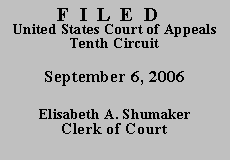

| JESUS MENDOZA, |
|
| v. | |
| BRUCE HOWARD, Warden, |
|
Before HENRY, BRISCOE, and O'BRIEN, Circuit Judges.
In December 2003, Mr. Mendoza pleaded guilty to distribution of controlled dangerous substances, unlawful possession of a controlled dangerous substance, unlawful possession of drug paraphernalia, and cultivation of a controlled dangerous substance. Mr. Mendoza did not seek to withdraw his plea.
On November 28, 2005, Mr. Mendoza filed this § 2254 petition in federal court. The magistrate judge recommended denial of the petition as time-barred under the one-year limitation period established by 28 U.S.C. § 2244(d). The magistrate judge also noted that Mr. Mendoza did not present any exceptional circumstances that might warrant equitable tolling. The district court adopted these recommendations and denied Mr. Mendoza a COA.
II. DISCUSSION
A COA can issue only "if the applicant has made a substantial showing of the denial of a constitutional right." 28 U.S.C. § 2253(c)(2). "A petitioner satisfies this standard by demonstrating that jurists of reason could disagree with the district court's resolution of his constitutional claims or that jurists could conclude the issues presented are adequate to deserve encouragement to proceed further." Miller-El v. Cockrell, 537 U.S. 322, 327 (2003). When a district court has dismissed a habeas petition on procedural grounds, a certificate will only issue when "jurists of reason would find it debatable whether the district court was correct in its procedural ruling." Slack v. McDaniel, 529 U.S. 473, 484 (2000).
Under 28 U.S.C. § 2244(d)(1), "[a] 1-year period of limitation shall apply to an application for a writ of habeas corpus by a person in custody pursuant to the judgment of a State court." 28 U.S.C. § 2244(d)(1). Mr. Mendoza's conviction became final on December 19, 2003, ten days after the pronouncement of his judgment and sentence. See Fisher v. Gibson, 262 F.3d 1135, 1142 (10th Cir. 2001) (petitioner's guilty plea convictions were not appealed, and, therefore, became final ten days after entry of the judgment and sentence) (citing Okla. Stat. tit. 22, § 1051; Rule 4.2, Rules of the Oklahoma Court of Criminal Appeals). Therefore, absent tolling, Mr. Mendoza had until December 19, 2004 to file a timely federal habeas petition.
Before the district court, Mr. Mendoza argued the limitations period is subject to statutory tolling while he proceeded with his postconviction filings. However, Mr. Mendoza first sought postconviction relief on July 15, 2005, after the expiration of the limitations period. Therefore, statutory tolling is unavailable to him for this filing. See Fisher, 262 F.3d at 1142-43.
Mr. Mendoza also argued that he was entitled to statutory tolling for two separately filed motions for sentence modification under Okla. Stat. tit. 22, § 982a. The magistrate judge correctly concluded that such sentence modification motions do not "constitute post-conviction proceedings for purposes of tolling the AEDPA limitations period." Rec. doc. 17 at 5 (Mag. Judge's Report and Recommendation, dated Feb. 24, 2006). Furthermore, the magistrate judge also correctly concluded that, even if motions filed pursuant to Okla. Stat. tit. 22, § 982a would qualify to statutorily toll the limitations period, such tolling would not save Mr. Mendoza's § 2254 petition from its untimely filing. The magistrate judge also determined that Mr. Mendoza failed to demonstrate any extraordinary circumstances that might warrant equitable tolling. See Gibson v. Klinger, 232 F.3d 799, 808 (10th Cir. 2000).
Based on our review of the record on appeal, the magistrate judge's report and recommendation, the district court's order, and Mr. Mendoza's submissions to this court, we are not persuaded jurists of reason would disagree with the district court's disposition of Mr. Mendoza's § 2254 petition. Accordingly, we DENY Mr. Mendoza's request for a COA, DENY his motion to proceed IFP, and DISMISS the matter.
Entered for the Court,
Robert H. Henry
Circuit Judge